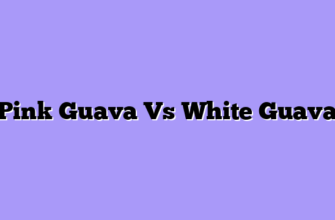Guava paste, a sweet and tangy treat made from concentrated guava pulp, is a popular ingredient in many cuisines. Its versatility makes it a staple in kitchens worldwide, used in desserts, sauces, and even savory dishes. However, like any food product, guava paste has a shelf life, and understanding how long it lasts is crucial for ensuring its quality and safety.
Shelf Life of Guava Paste
The shelf life of guava paste depends on several factors, including the method of preparation, storage conditions, and the presence of preservatives. Homemade guava paste, typically made without preservatives, has a shorter shelf life compared to commercially produced varieties. This is because homemade paste relies on natural sugars for preservation, which are less effective than artificial preservatives.
Generally, homemade guava paste can last for up to 2 weeks when stored properly in the refrigerator. It’s essential to keep it in an airtight container to prevent moisture absorption and spoilage. The paste should be stored in the coldest part of the refrigerator, ideally at a temperature below 40°F (4°C).
Commercially produced guava paste, often containing preservatives like citric acid or sodium benzoate, has a longer shelf life. These preservatives help inhibit the growth of bacteria and mold, extending the paste’s lifespan. Depending on the brand and specific ingredients, commercially prepared guava paste can last for several months, even up to a year, when stored properly.
The best way to determine the shelf life of your guava paste is to check the expiration date printed on the packaging. This date indicates the manufacturer’s recommended time frame for optimal quality and freshness. However, even after the expiration date, guava paste may still be safe to consume if it has been stored properly and shows no signs of spoilage.
To ensure the safety and quality of your guava paste, it’s crucial to look for signs of spoilage. Mold growth, an off-odor, or a change in texture are all indicators that the paste has gone bad and should be discarded. If you notice any of these signs, it’s best to err on the side of caution and throw away the paste to avoid potential foodborne illness.
Factors Affecting Guava Paste Longevity
The most significant factor affecting the longevity of guava paste is storage. Proper storage conditions play a vital role in preserving its freshness and preventing spoilage. Ideally, guava paste should be stored in an airtight container, preferably in the refrigerator. This helps to minimize exposure to air, moisture, and temperature fluctuations, all of which can accelerate deterioration.
Another crucial factor is the method of preparation. Homemade guava paste, while often tastier, may have a shorter shelf life compared to commercially produced varieties. This is because homemade paste may not undergo the same rigorous processing and preservation techniques as commercially available products. For instance, commercially produced guava paste often undergoes pasteurization, a heat treatment that eliminates harmful bacteria and extends its shelf life.
The ingredients used in the guava paste also play a role in its longevity. The addition of preservatives, such as sugar or citric acid, can help to inhibit microbial growth and extend the shelf life. However, it’s important to note that excessive sugar content can lead to crystallization and affect the texture of the paste.
Furthermore, the environment in which the guava paste is stored can significantly impact its shelf life. High temperatures and humidity can accelerate spoilage, while cool and dry conditions help to preserve its quality. Therefore, it’s essential to store guava paste in a cool, dry place, away from direct sunlight and heat sources.
Finally, the visual and olfactory cues of the guava paste can provide valuable insights into its freshness. A change in color, texture, or smell can indicate spoilage. If the guava paste appears discolored, moldy, or has an off-putting odor, it’s best to discard it.
Proper Storage for Guava Paste
The longevity of guava paste depends largely on the storage method employed. When stored correctly, guava paste can retain its flavor and texture for an extended period. However, improper storage can lead to mold growth, texture changes, and a loss of flavor.
To maximize the shelf life of guava paste, it is recommended to store it in an airtight container. This helps to prevent exposure to air, which can cause oxidation and deterioration. Glass jars with airtight lids are ideal, as they are non-reactive and prevent the paste from absorbing any unwanted flavors.
Once stored in an airtight container, guava paste can be kept in the refrigerator for several months. The cool temperature of the refrigerator slows down the growth of bacteria and mold, preserving the paste’s quality. However, it is important to note that the texture of the paste may slightly change over time, becoming firmer due to the cold temperature.

When thawing frozen guava paste, it is important to do so gradually in the refrigerator. Rapid thawing can lead to uneven texture and a watery consistency. Once thawed, guava paste should be used within a few days.
While guava paste can be stored for a considerable period, it is always advisable to check for any signs of spoilage before consumption. Mold growth, an off-odor, or a change in texture are all indicators that the paste has gone bad and should be discarded.
Signs of Spoiled Guava Paste
The most obvious sign of spoiled guava paste is a change in its appearance. Fresh guava paste typically has a vibrant, reddish-brown color and a smooth, uniform texture. As it ages, the color may fade, becoming dull or even grayish. The texture can also change, becoming grainy, lumpy, or even moldy. Mold growth, often appearing as fuzzy patches, is a clear indication of spoilage and should be avoided.
Beyond visual cues, the smell of guava paste can also reveal its condition. Fresh guava paste has a sweet, fruity aroma, reminiscent of ripe guavas. However, spoiled guava paste may emit an off-putting odor, often described as sour, musty, or even rancid. This change in smell is a result of bacterial growth and indicates that the paste has gone bad.
Another indicator of spoiled guava paste is a change in its taste. Fresh guava paste has a sweet, tangy flavor that is both pleasant and refreshing. Spoiled guava paste, on the other hand, may taste sour, bitter, or even metallic. This change in taste is due to the breakdown of sugars and the formation of undesirable compounds.
While visual, olfactory, and gustatory cues are helpful in identifying spoiled guava paste, it’s important to consider the storage conditions as well. Guava paste should be stored in a cool, dry place, ideally in an airtight container. Exposure to heat, moisture, or air can accelerate spoilage. If the paste has been stored improperly, it’s more likely to have gone bad, even if it doesn’t exhibit obvious signs of spoilage.
In addition to the aforementioned signs, it’s also important to be aware of the expiration date printed on the packaging. While not always an accurate indicator of spoilage, it provides a general guideline for the product’s shelf life. If the expiration date has passed, it’s best to err on the side of caution and discard the paste.
Tips for Extending Guava Paste’s Shelf Life
The shelf life of guava paste depends on several factors, including storage conditions and the method of preparation. Generally, homemade guava paste, which often lacks preservatives, has a shorter shelf life compared to commercially produced varieties. Homemade guava paste, stored at room temperature, can last for a few weeks, while refrigerated paste can last for several months. Commercially produced guava paste, often containing preservatives, can have a shelf life of up to a year when stored properly.
To ensure the longevity of your guava paste, proper storage is paramount. Refrigeration is the most effective way to extend its shelf life. Store the paste in an airtight container, preferably a glass jar, to prevent moisture absorption and oxidation. This will help maintain its texture and flavor. Freezing is another option for long-term storage. Place the paste in a freezer-safe container, leaving some space for expansion, and freeze for up to a year. When ready to use, thaw the paste in the refrigerator overnight.
While refrigeration and freezing are effective methods for extending shelf life, there are other tips to consider. For instance, using a clean and dry utensil when scooping out the paste helps prevent contamination. Additionally, storing the paste in a cool, dark place, away from direct sunlight and heat, can further prolong its freshness.
It’s important to note that even with proper storage, guava paste can eventually lose its quality. Signs of spoilage include mold growth, a change in color, an off-odor, or a change in texture. If you notice any of these signs, it’s best to discard the paste.
In conclusion, understanding the factors that influence the shelf life of guava paste and implementing proper storage techniques can significantly extend its lifespan. By following these tips, you can enjoy the deliciousness of guava paste for a longer period, maximizing its use and minimizing waste. Remember, a little care and attention can go a long way in preserving the quality and freshness of this versatile ingredient.
Q&A
**1. How long does guava paste last in the refrigerator?**
* Up to 2 weeks.
**2. How long does guava paste last at room temperature?**
* A few days, but it’s best to refrigerate it.
**3. Can guava paste be frozen?**
* Yes, it can be frozen for up to 6 months.
**4. How do you know if guava paste has gone bad?**
* It will develop a moldy appearance, have an off odor, or change in texture.
**5. What is the best way to store guava paste?**
* In an airtight container in the refrigerator.Guava paste, when properly stored, can last for several months.








